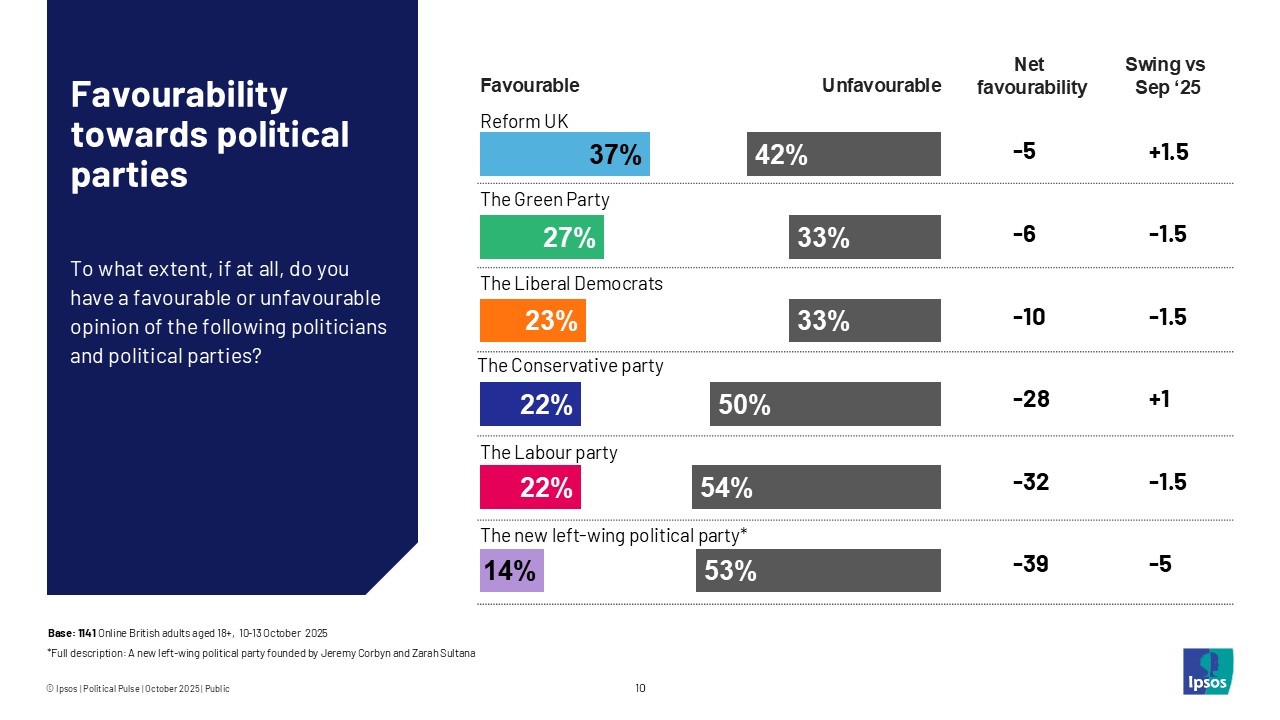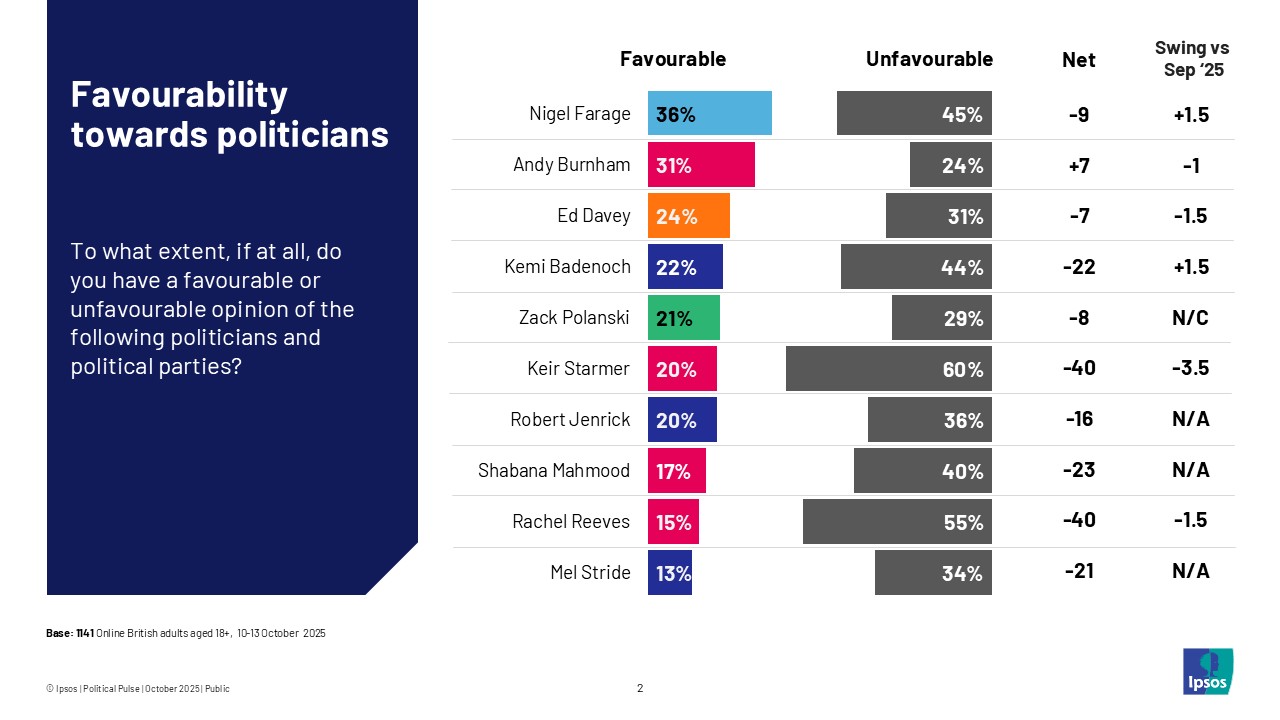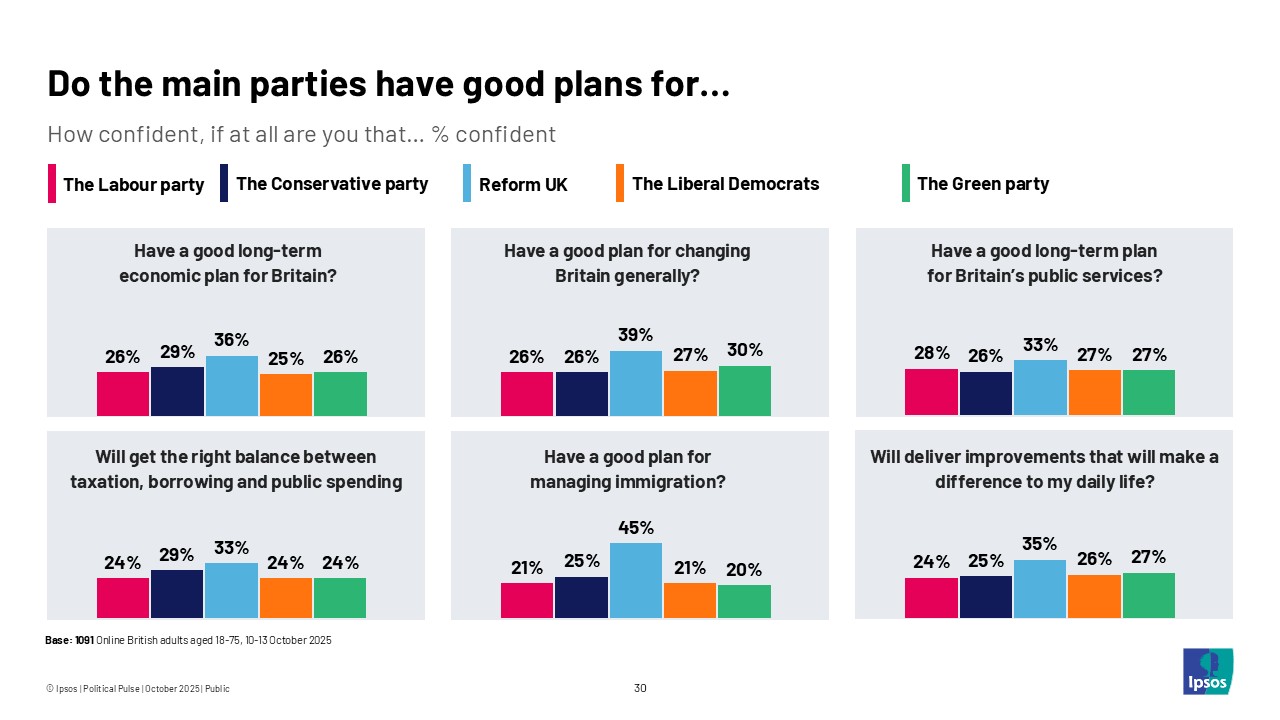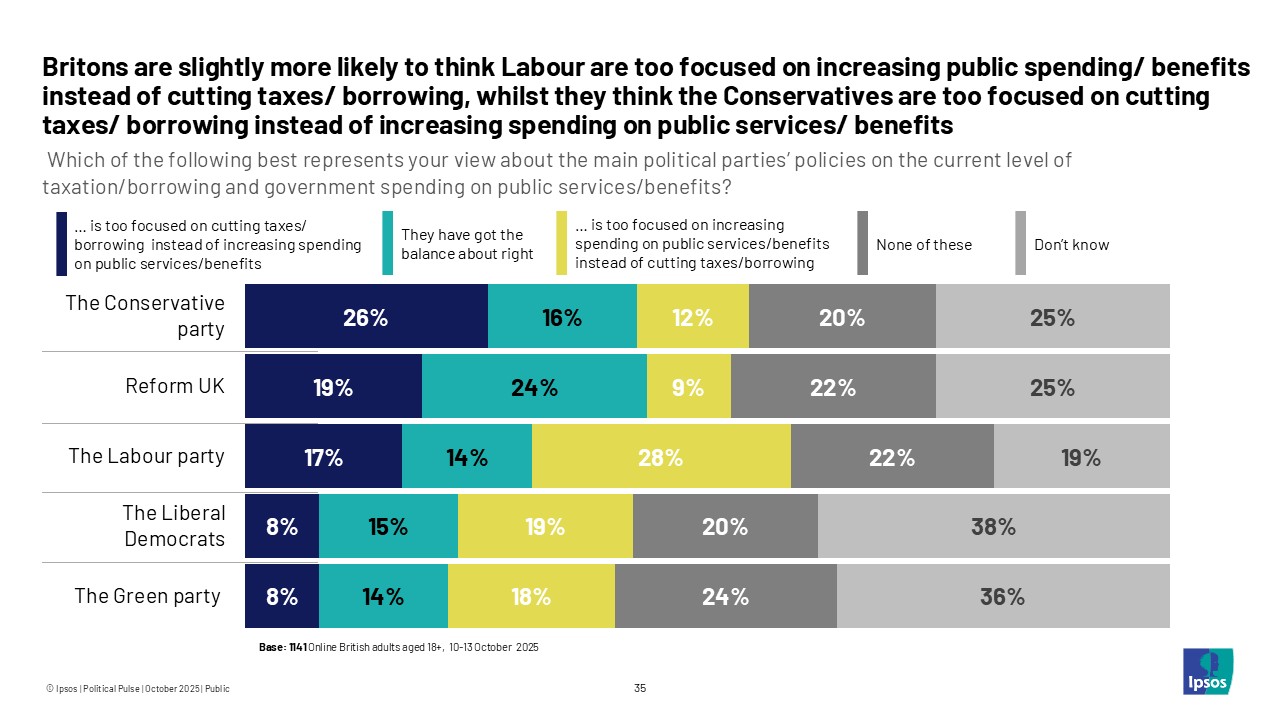Nigel Farage leads Keir Starmer in head-to-head on who Britons would prefer as Prime Minister
New data from Ipsos in the UK’s Political Pulse survey, taken October 10-13, reveals that for the first time in our Ipsos Political Pulse polling series, Reform UK leader Nigel Farage has a slight lead over Keir Starmer when Britons are asked their preferred choice for Prime Minister.
- For the first time, Nigel Farage holds a slight lead over Keir Starmer as the preferred choice for Prime Minister, with 33% of respondents supporting Farage compared to Starmer's 30%.
- Britons are also now slightly more likely to say they would prefer Reform UK led by Nigel Farage to win the next UK General Election (39%) than the Labour party led by Keir Starmer (36%).
- Keir Starmer’s lead over Kemi Badenoch in terms of who would make a better Prime Minister has been reduced compared to last month. 27% say they would prefer Starmer compared to 22% who say Badenoch (+5 ppt Starmer lead, compared to +12 in September).
- Andy Burnham (26%) continues to lead Keir Starmer (17%) in terms of who the public think would make a better Prime Minister. But around two in five (43%) Britons say neither or think there would be no difference.
Favourability towards political parties

- 22% are favourable towards the Labour party, with 54% unfavourable (net -32).
- Reform UK has a net rating of -5, up from -8 last month. 37% hold a favourable view of the party, with 42% unfavourable.
- 22% express a favourable view of the Conservative party, with 50% unfavourable (net -28, up slightly from -30 last month).
- The Green Party’s net rating is -6, down from -3 last month. 27% are favourable towards the party, while a third (33%) are unfavourable.
- The Liberal Democrats sit at -10. 23% express a favourable view and 33% unfavourable.
Favourability towards politicians

- Reform UK leader Nigel Farage has a net favourability of -9 (up from -12 last month) with 36% of Britons viewing him favourably and 45% unfavourably.
- 31% are favourable towards Manchester Mayor Andy Burnham and 24% unfavourable. The only politician in our list with a net positive favourable rating.
- Prime Minister Keir Starmer's net favourability stands at – 40, down from -33 last month (20% favourable, 60% unfavourable).
- Leader of the Opposition Kemi Badenoch has a net favourability of -22 (22% favourable, 44% unfavourable).
- 24% hold a favourable view of Liberal Democrat leader Ed Davey, while 31% are unfavourable, giving him a net score of -7 (down slightly from -4 last month).
- 15% are favourable towards Chancellor Rachel Reeves, while 55% are unfavourable, giving her a net rating of -40 (down slightly from -37 last month).
- 21% are favourable towards Green Party leader Zack Polanski, while 29% are unfavourable (net -8).
Government performance
- Two in three (67%) continue to say that the country is heading in the wrong direction, while 16% say it is heading in the right direction (14% neither, 4% don’t know), giving a net rating of -51.
- When asked to score the government’s performance on a scale of 0-10, the Labour government receives an average performance rating of 3.3 out of 10 (-0.2 from last month). Those aged 16-34 (4.6) and Labour voters (5.3) continue to rank the government highest, while those aged 55+ (2.6) and Reform UK voters (1.4) continue to score it lowest.
Key issues
- Healthcare/the NHS (62%), inflation/the cost of living (57%), and immigration (53%) continue to be the issues that Britons say will be most crucial in deciding their vote for the next general election.

- When asked who the best party is on a range of key policy issues,
- Reform UK leads on having a good long-term economic plan for Britain (36%), followed by the Conservatives (29%).
- Reform UK also leads on having a good plan for changing Britain generally (39%), followed by the Green party (30%).
- Reform UK is also significantly ahead on managing immigration (45%), followed by the Conservatives on 25%.
Economic policies

- Britons are slightly more likely to think Labour are too focused on increasing public spending/ benefits (28%) instead of cutting taxes/ borrowing (17%), whilst they think the Conservatives are too focused on cutting taxes/ borrowing (26%) instead of increasing spending on public services/ benefits (12%). One in four think Reform UK have got the balance about right (24%).
- If the government needed to increase taxes to raise revenue, Britons are most likely to prefer increasing income tax paid on income over £125,000 (46%). When those who chose income tax paid on income over £125,000 are asked to choose again with this option removed, they are most likely to say they would prefer to raise revenue by increasing income tax paid on income between £50,000 and £125,000 and by increasing tobacco and alcohol duty.
- There is significant support (64%) for the introduction of a wealth tax, defined as a tax of 1% annually on assets above £10 million and of 2% on assets above £1 billion. This includes majorities of 2024 Labour (75%), Conservative (61%), and Reform UK voters (59%).
- Around half (47%) of Britons believe that the introduction of a wealth tax would increase the amount of money the government can spend on public services. However, 36% say it would reduce how attractive the UK is to businesses and entrepreneurs.
- Following Kemi Badenoch’s announcement that the Conservative party would abolish stamp duty on the purchase of a main home, 42% of Britons say they support the policy, although four in ten (40%) believe it would not significantly impact economic growth.
Keiran Pedley, Director of UK Politics at Ipsos said:
There are some good numbers in here for Reform UK, with the public having more confidence in them on the economy and immigration than other parties and Nigel Farage leading Keir Starmer on who the public would prefer as Prime Minister.”
“Our data also shows the challenge Labour could face from the left at the coming budget. If tax rises are to come, the most palatable to the public are those on higher earners or a wealth tax, such as that suggested by the Greens. As the Chancellor Rachel Reeves weighs up possible tax rises, the fact that these appeal to Labour voters may well present a political challenge moving forward.
Technical note
- Ipsos interviewed a representative sample of 1,141 adults aged 18+ across Great Britain. Interviews were conducted online between the 10th-13th October 2025.
- Data are weighted to match the profile of the population. All polls are subject to a wide range of potential sources of error.




